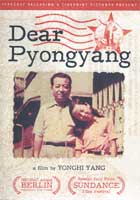
Dear Pyongyang 2005
Distributed by Women Make Movies, 462 Broadway, New York, NY 10013; 212-925-0606
Produced by Toshiya Inaba
Directed by Yonghi Yang
DVD, color, 107 min.
Sr. High - Adult
Japanese studies; Korean studies; Women’s studies; Political Science, Cultural studies and History
Date Entered: 02/11/2011
Reviewed by Winifred Fordham Metz, University of North Carolina at Chapel HillWith Dear Pyongyang, director Yonghi Yang has crafted a deeply personal narrative reflecting on her family’s history as Zainichi (ethnic Koreans) living abroad in Japan. As the title implies, the film works as a type of letter or multi-layered communication between family members; from “…a model revolutionary and patriotic family” honoring its motherland, from father to sons – explaining the political legacy and unfolding truths behind his decision to send them back to Korea, from a loving husband to his loyal wife, and ultimately from daughter to father—revealing her dissention from the ideologies of her family.
Yang lays out a history lesson during the first four minutes of the film—beginning with the 1910 assumption of the Korean peninsula into the Japanese Empire. She outlines the 1945 liberation of Korea and its division into North and South—with the establishment of the Republic of Korea (South) and the Democratic People’s Republic (North) in 1948. Noting that the Korean war intensified antagonism between the North and South, Yang goes on to explain that 99 percent of the Zainichi living in Japan were originally from South Korea but that they became divided into both North and South nationalities.
Careful to provide context with regard to her family, Yang introduces her father who was originally from Jeju Island in South Korea. We learn that he became a supporter of Kim Il Sung at 15 and was one of the founding members of the pro-north Chongryun organization. Yang’s mother was an ardent activist as well, often working alongside her husband in the Chongryun organization. In 1971, as part of the “return project,” Yang’s father decides to send all three of her brothers “back” (although they were all born in Japan) to Korea. He later explains to her that he was faithful in his belief in a unified, socialist Korea and felt certain that things would be good for them there.
After an 11-year breach, Yang begins to visit her brothers in Korea and later chronicles some of these visits on camera. The audience is afforded entrée into a normally closed environment. Conditions are bleak. And we come to learn that Yang’s mother has been largely subsidizing her sons’ existence in Korea for years—via ever-increasing care packages filled with essential care items, like medicine, gifts and money.
The film is shot in the style of a home movie with Yang helming the camera for the duration of the film (if you look very closely, in the scenes shot in her parent’s dining room you can see a tiny reflection of her in the vanity through the bathroom door). While she is not seen on camera, her voice is ever present, with her questions and recollections guiding throughout. These devices underscore Yang’s personal quest and the important intimacy she provides us in these conversations and interactions with her family. As the film progresses, it becomes more apparent that her visual absence from the film parallels to some degree her absence in the decisions her family made to send her brothers to Korea, as well as their remaining in Japan (a question that was never clearly posed or answered). It also most certainly evokes her absence from the family’s collective political ideologies.
This film is highly recommended for people interested in Korean studies, Japanese studies, women’s studies, cultural studies, political science and history. It will easily be used in high school level classrooms and above to motivate discussions on these and other similar topics.
Awards
- Special Jury Prize, Sundance Film Festival
- Netpac Award, Berlin International Film Festival